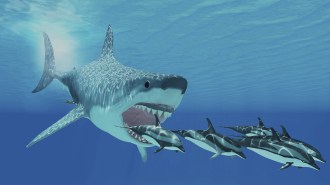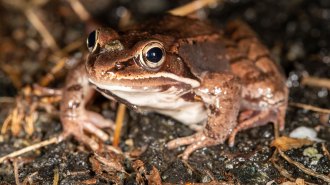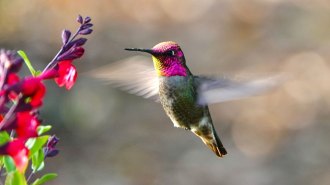News
-
 Astronomy
AstronomyA newfound, oddly slow pulsar shouldn’t emit radio waves — yet it does
The highly magnetic neutron star rotates three times slower than the previous record holder, challenging the theorical understanding of these objects.
By Liz Kruesi -
 Ecosystems
EcosystemsJust 3 ingredients can quickly destroy widely used PFAS ‘forever chemicals’
Ultraviolet light, sulfite and iodide break down enduring PFAS molecules faster and more thoroughly than other UV-based methods.
By Nikk Ogasa -
 Particle Physics
Particle PhysicsHow neutrinos could ensure a submarine’s nuclear fuel isn’t weaponized
Nuclear submarines could be monitored with the help of neutrinos to ensure that the fuel isn’t diverted to nuclear weapons programs
-
 Computing
ComputingThe world’s fastest supercomputer just broke the exascale barrier
The Frontier supercomputer at Oak Ridge National Laboratory in Tennessee clocked in at more than 1.1 quintillion calculations per second.
-
 Health & Medicine
Health & MedicineTrained dogs sniff out COVID-19 as well as lab tests do
Dogs can be trained to sniff out COVID-19 cases. They’re overall as reliable as PCR tests and even better at IDing asymptomatic cases, a study suggests.
-
 Astronomy
AstronomyThe Solar Orbiter spacecraft spotted a ‘hedgehog’ on the sun
In its closest flyby yet of the sun, the Solar Orbiter came within 48 million kilometers of our star, revealing new details.
By Liz Kruesi -
 Paleontology
PaleontologyGreat white sharks may have helped drive megalodons to extinction
Analyzing zinc levels in shark teeth hints that megalodons and great whites competed with each other for food.
-
 Animals
AnimalsAn ‘acoustic camera’ shows joining the right boy band boosts a frog’s sex appeal
Serenading with like voices may help male wood frogs woo females into their pools, analysis of individual voices in a frog choir shows.
By Susan Milius -
 Climate
ClimateScientists hope to mimic the most extreme hurricane conditions
A $12.8 million NSF grant is funding the design of a facility that can generate winds of at least 290 kilometers per hour and towering storm surges.
-
 Chemistry
ChemistryScientists made a Möbius strip out of a tiny carbon nanobelt
A twisted belt of carbon atoms joins carbon nanotubes and buckyballs in the list of carbon structures scientists can create.
-
 Science & Society
Science & SocietyMass shootings and gun violence in the United States are increasing
In the wake of mass shootings in Buffalo, N.Y., and Uvalde, Texas, a gun violence researcher shares what can be done to reduce gun violence deaths.
By Nikk Ogasa -
 Life
LifeHigh altitudes may be a climate refuge for some birds, but not these hummingbirds
After being moved to a spot high above their typical home, Anna’s hummingbirds seemed to struggle to hover in the thin air.